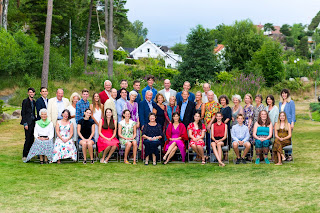 |
| Frog's party outfit |
The guests were to number 75
(chiming, whether by accident or design I don’t know, with the age of my aunt),
part family, part friends, and before it started we family assembled on the hotel's lawn for a formal photograph. There was much kissing and hallo-ing and catching
up with decades of news, then giggling as the brave photographer tried to
marshal us into some sort of order. A nearby guest, obviously trying to get
some sleep, shut his window pointedly and we all giggled some more.
We then had drinks on a terrace and met my
aunt’s friends.
 |
| The family photograph |
I talked (in English) to a Brazilian woman who’d
arrived as a teenager as an exchange student and stayed ever since.
‘I felt at home the moment I arrived,’ she
said.
‘What did you like about the country?’ I
asked.
‘It’s so calm and well organised,’ she
replied.
After that we filed into one of the hotel’s
beautiful dining-rooms and searched for our named places. I was opposite a
Norwegian cousin whom I knew and next to one of my aunt’s friends whose mouthful
of a name - Peder Johan Pedersen - I never quite got until I read the guest
list afterwards. ‘He lives on a beautiful island,’ my aunt had explained to me,
‘and does a lot of work for the environment.’ Many Norwegians live on islands,
I remembered – Norway has many to choose from – but usually only in the summer,
I thought.
‘Were you brought up on the island?’ I asked.
The table’s conversation was being
conducted in a mixture of English and Norwegian, with the Norwegians
apologising to me whenever they lapsed into their own language.
Peder Johan nodded.
‘How did your parents make a living?’
‘My father was away at sea to start with and
then he kept mink for their fur.’
Like in Britain, escaped mink have now
become a problem in Norway, he said, because they eat all the fish.
Peder Johan himself kept an ancient breed
of sheep called Viking sheep which can stay out all winter and from whose wool
the Vikings wove their sails.
He told me the story of his wife’s brother
who during the Second World War aged 19 had rowed (sailed?) across the North
Sea in November with a couple of friends in order to escape having to ‘work’
for the occupying Germans - ‘work’ usually meaning fighting against the
Russians on the Eastern Front. The boys had landed at Lindisfarne, and Peder and his
wife had recently made a trip there.
This was the first of many stories I was to
hear about the war.
Food was interspersed with entertainment by
the guests – poems, songs, speeches, a dance – again in English and Norwegian,
much of it about my aunt’s extraordinary life. Her mother had died when my aunt was just nine and after a spell living with relatives in Norway my aunt had come to live with my
family, my mother - her sister - being sixteen years older than her and married (with a baby –
me – the first of what was to be five children). In consequence, I’d always thought of my aunt as a
strange sort of older sister. In her twenties she’d returned to Norway and taught
English at Kristiansand University. Now she was a prose writer and poet in both
English and Norwegian.
She'd written her autobiography and it had been published in Norway (where I think she is quite famous) and although she'd translated it into English - and we'd all read it avidly - she hadn't yet looked for a UK publisher. My sister-in-law K wrote and illustrated an enchanting poem based on the autobiography and performed it at the party. All the guests received a printed copy.
As the stories about the past unfolded, I had
to keep mopping my eyes, and when I looked around I saw that my brothers and
sisters were all doing the same.
She'd written her autobiography and it had been published in Norway (where I think she is quite famous) and although she'd translated it into English - and we'd all read it avidly - she hadn't yet looked for a UK publisher. My sister-in-law K wrote and illustrated an enchanting poem based on the autobiography and performed it at the party. All the guests received a printed copy.
 |
| Part of my sister-in-law's enchanting poem about my aunt's life |
On the terrace after supper one of the
Norwegians – dressed like all the other men there in a plain shirt and jacket –
gently teased Frog about his garb, and it occurred to me that might these
supposedly stiff Norse people be more tolerant and easy-going than the
supposedly open-minded British? We’d had a delightfully informal evening and I
wondered what the equivalent occasion would have been like in Britain. More rigid and
traditional, I feared, with a stricter dress code and more of a prescribed
routine to stick to. More likely to give me a migraine.
Frog and I had suffered a great deal from
prejudice, as you will know if you’ve been reading earlier posts. In addition,
with my height and my passion for solitude, wild places and snow, I’d
never felt wholly English (which I suppose I’m not).
No comments:
Post a Comment
Your comment won't be visible immediately. It comes to me first (via email) so that I can check it's not spam. I try to reply to every comment but please be assured that, even if I don't, every genuine comment is read with interest and greatly appreciated. Thank you!